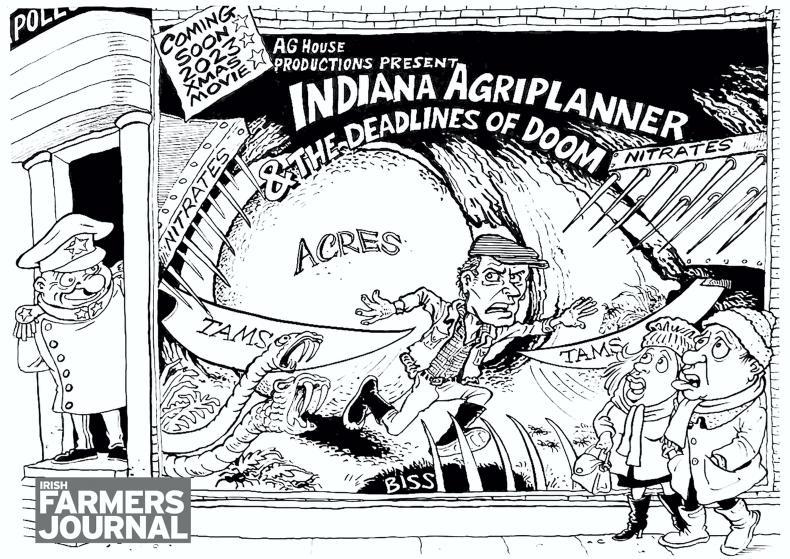This time three years ago, I was in bed, sick as a small hospital. It wasn't self-inflicted, at least not in the sense of drinking.
I'd been designated driver on St Stephen's night, getting my sons and some of their friends home as the county's youth made up for a year spent in isolation.
And then I was sniffling and snorting. I went up to the kitchen and took a COVID test. Sure enough - two red lines, I was encountering the dreaded virus for the first time.
I hopped back into bed, but before I did, I brought my masked self into the living room to deliver the bad news to my wife.
"Ta na sicíni ag teacht abhaile," arsa mise.
In my pigeon Irish, I was accepting that my gallivanting, or that of the lads, had come at a cost. I wasn't alone, COVID was rampant in the following days and weeks.
Since then, my little bit of Gaelgoirí has become a bit of a catchphrase in our house.
Department's own turn now
What does that anecdote have to do with anything, I hear you ask. Well, I think it fits the bill for much that has happened this year.
Chickens are coming home to roost all over. I'm not going to talk about the hubris of farmers paying crazy money for land to rent or buy on the back of temporarily good milk and grain prices.
And I don't think it's the time of year to have a dig at the minority of farmers who have ignored all warnings about best practice in relation to slurry usage, who certainly have contributed to the changes being made to the derogation.
There is truth in that, but peace and goodwill to all men, and all that.
I am thinking, rather, of the Department of Agriculture and its year-long battle to administer the vast web of farmers schemes.
We have had delayed payments and narrow windows for applications. We have seen thousands more farmers than normal left waiting into December to receive most of their direct payment.
And the pressure has been palpable, on people as well as systems, on Department officials as well as agri consultants and farmers.
There's nothing new in people struggling and failing to meet the demands of an ever more complex network of agri schemes. What is new is that the Department itself is feeling the pressure like never before.
It has to be acknowledged that this year is the first year of a new payment system
Of course, it has to be acknowledged that this year is the first year of a new payment system. It's the first year of BISS, of CRISS, of eco schemes and ACRES.
It was also a year where the difficult weather - cereal crops were unusually being planted way into May all over the country, complicating BISS applications.
As bad farming conditions continued right into the harvest, farmers were given some flexibility as to where they carried out various tillage-related ACRES actions. All this complicated the picture.
But the whole thing has been getting progressively more difficult to stay on the right side of for years. And I don't mean out in the fields and the farmyard. I mean the paperwork, the administration.
For decades, farmers have been struggling with this aspect of farming as it ratchets up annually. Many farmers have limited education, many are older, some are not comfortable with smartphones or laptops. Keeping everything in order is a struggle.
Caught out myself
I don't fit those categories, but I am one of an army of part-time farmers. That is my choice and I can't blame anyone else for that decision. However, it means that form filling often takes second place to my day job.
In the census last year, only 61,473 people described themselves as farmers. That's less than half the BISS applicants. I am in the majority.
And this year, I have really struggled to keep up with the paperwork.
There have been some lapses. I missed the deadline for the lime scheme altogether. I had applied originally, bought 120t of lime, had it spread, but in mid-November, I went to check the status of my application only to discover I had missed the deadline for completing the paperwork and the scheme was now closed. Totally my own fault.
COVID II
There were some contributory factors. As a tillage farmer, we were battling the calendar and the elements in the fields. Work was slow and late. The dreaded COVID returned, for the fourth time, leaving me unable to stay at screens for as long as my two jobs demand.
Also, my rather wonderful agri planner had told me earlier in the year that I would have to make a decision - either allow them to do all my form-filling or none.
I was conflicted, as I have always completed the BISS application myself. As someone who works off-farm much of the time, I feel it keeps me connected to the business in an important way. And this year it backfired.
My planner made that decision because their workload had reached the point where they couldn't afford to be mopping up after a client had made an erroneous application, then come running for help when the sicíni, or more accurately the Department, came calling and querying. Add that to a range of schemes that has expanded towards 30. Then there’s new fieldwork relating to ACRES assessment or geotagged photographs where cropping is queried.
And that’s before we mention the ludicrously short timelines for applications. ACRES was only open for four weeks. There were stories of agri planners working round the clock to satisfy customer demand, in the full knowledge that many of their clients would probably fail to access the scheme, with only 4,000 places available.
Other planners, for this cocktail of reasons, are rumoured to have told clients not to bother applying. The unharvested crops scheme was open for less than two weeks. I get the clear sense that planners are at breaking point.
We all get our turn
And now it seems that the weight of the burden of all these schemes, which has farmers bewildered and agri consultants buckling, is now placing an unbearable burden on the Department itself.
I have sympathy for the men and women making the checks, issuing the cheques, manning the phonelines. They must be exhausted and sleeping through much of Christmas.
There is one final point. The people who are left waiting for money because of the bureaucratic jungle are always farmers. And some planners, who are waiting for farmers to get paid so they can be paid in turn.
It doesn’t matter where in the system the logjam is, it’s the farmer who pays the price. And while Department officials have gotten a taste of what it’s like to be struggling to make deadlines - and missing them - I hope they never have to experience what it’s like to have an empty bank account and no certainty as to when an impasse will be resolved. Especially coming up to Christmas.
I wouldn’t wish that on my worst enemy.






 This is a subscriber-only article
This is a subscriber-only article









SHARING OPTIONS: